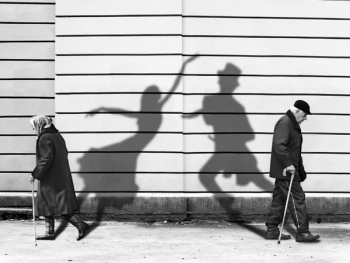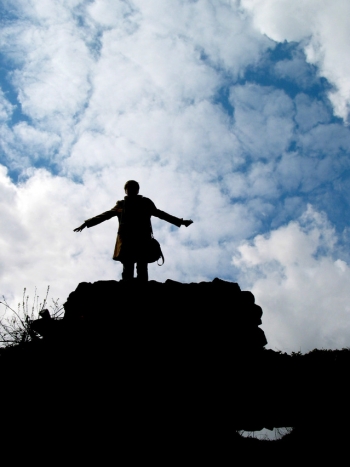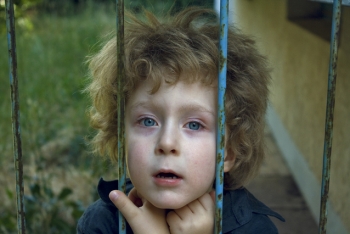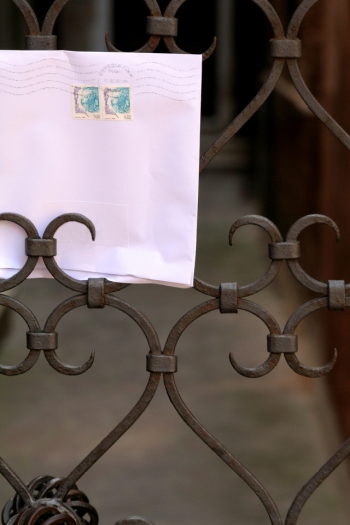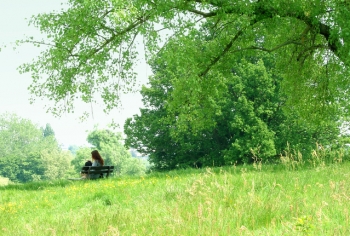
Blog (409)
My hope is to offer encouragement to writers as well as those who simply love to read. You will find eclectic snippets here—news of projects I’m working on, comments regarding books I enjoy, favorite authors, quotes, and reflections regarding my own experiences. I especially like to write about my dreams—those parables in the night seasons. Symbols and metaphors delight and intrigue me. You will find them here.
There is a hint of autumn about. I took advantage of the subtle change and headed out for a walk, the sun warm on my back, like a lover's gentle touch. How good it felt to be moving, lifting my face to the sky, inhaling the freshness of the day. One more day. New mercies.
Fisherman dotted the tidal creek where I typically walk. I longed for solitude so headed another direction--to a piece of property in my neighborhood that sits back on a wooded lot. The house that once stood is gone. A vine-covered foundation is the only remaining visage of the long-ago home. I'm drawn to this property again and again. Sometimes I perform stretching exercises on the cement foundation. A stage.
He is mean--a short man with a pot belly. He dons pinstripe suits and green plaid bow ties. He wears a sour expression, his lips pursed in perpetual derision. He is the penultimate critic. He scolds. His mantras include a plethora of reproof: "Why did you do it that way? This way is much more efficient." "Who told you that was a good idea?" "I've never seen the likes of that." "You missed a spot." "You'll never go anywhere doing things like that. What are you? Crazy?" Well, perhaps so--when I listen to Professor Zizzle's harsh litany of personal censorship. I named this character after he showed up in my dreams several times over. His pinched up face, bald pate and tufts of gray, wiry hair ringing his head make him recognizable. In the last dream, he brags that he can fly by psyching himself up and imagining that he is aloft. And in the dream I watch as Professor Z zips around a few feet above ground, cackling with glee that he is oh so much better than I or anyone else.
I knew she'd been the homecoming queen at her high school some years ago. I could believe it. She had impossibly blue eyes and I think what must have naturally been a golden brown halo of hair curling around her smooth, fair face. Now her eyes blazed just as blue, yet filled with anger, her now dyed red hair thin and lank. Her skin, though, still dewy and youthful. She hated me.
I went mute. Her outburst moved in on me like silent fog. I hadn't expected such vehemence. I could feel anxiety manifesting physically--the pink flush rushing up my neck and face, the prickly onset of perspiration on my upper lip. I actually didn't want to fight back, defend myself. I wanted to run--flee from the rasping, toxic voice. Be done with her.
But I couldn't be "done with her." She was a patient at the clinic where I work. She wasn't following the rules. In many ways, I could understand how she felt. To her I was like a cop, zeroing in on how she'd broken the law. In her tirade, she'd shouted, "Don't you know how hard I'm trying?" Then answered the question herself. "Of course you don't. You could never understand me."
I would have liked to say, "If only you knew that we're so much more alike than we are different. Human beings all have some form or other of pain and misery that we're attempting to move through. And we all have guidelines that we must navigate in this life. We all have failed at one time or another." But she couldn't hear. She was too mad. Too ashamed, I think, down deep to become vulnerable. She was in protection mode. I understood. How many times have I, too, been in protection mode? Rejecting help. Refusing to engage with people who've wanted to help me. Pushing God away.
They are rare now--practically extinct. Vintage. Letters--sealed up stories, handwritten narratives.
I remember as a girl waiting on the porch for the postman. He carried a leather bag strapped across his body and walked through my neighborhood delivering handfuls of missives. Almost every day a letter came from my grandmother or aunt or cousin. And I can still see my father pulling out sheets of plain white paper from his desk drawer in the evenings. He might write five or six letters in one sitting--and not just a line or two. He created letters two and three pages long. The envelopes sat stacked up in the entry way to be clipped to the mailbox with a wooden clothespin the next morning, ready to go out with the jolly mailman.
And in college there was nothing more exhilarating than twirling the combination lock on the post office box, pulling open that enclosure to discover a letter from Giovanni, the stamps from Italy pastel green or pink or lavender, exotic. The letters felt alive in my hands, breathing love, a feast for my heart. I still have those letters. My mother saved them for me. And every now and then I go back to that ancient bundle, still a banquet, the ink indelible, memorable.
This week I'm experimenting. I created a short-story. Only my second. Let me know what you think. And once again let me say how much I appreciate your faithfulness. Humble thanks, gentle readers.
He knows crestfallen. He doesn't need a mirror to know that life is different now. He is no longer one of the beloved whose pores secrete irresistibility. Now he can’t look at someone and let the color of his eyes do all the work. He is no longer enchanting—no longer pursued. And he is not old.
At fourteen, the neighbor girl said one day, “
“What?” he’d sputtered. “Get out.” But inside he knew. He already knew that he was one of the lucky ones. He could toss his head and the hair appeared to ripple and fall in place. His teeth reflected orthodontic good fortune, and the empathic gods had spared his face—no acne constellations. He possessed scarlet lips.
Cameron no longer made eye contact with the neighbor girl, the prophetess. She’d vanished. And she knew to avoid him. She knew her place.
At twenty-two he is lean, sporting well-defined biceps that can be described as practically magnificent. And sometimes in photos, if he’s in profile, you can’t tell, can’t see that one side of his face is destroyed, ugly with raised pink welts. Seared.
She’d heard about the accident—that awful car crash when he’d been drinking, the summer after graduation. It seemed a miracle he didn’t have more injuries, that he hadn't been killed. He'd been in the hospital for weeks. Everyone said he'd gone into seclusion. He didn't go to college. He didn't work She hadn't seen him since that day at Baskin Robbins where she'd been scooping ice cream. He'd winked at her when she handed him a cone of Rocky Road, a tanned, curvy cheerleader hanging all over him.
She’d known, even at seven, when they were inseperable, she wasn’t like him. Whenever they played at the park, strangers would pat Cameron's head and murmur, “What a cutie you are.” No one said things like that to her. She’d tolerated being invisible. He told her one day when they sat atop a tree they’d climbed as ten-year-olds, “Madeline, don’t tell my mom we climbed up here today. She’d be mad. I’m not supposed to go this far.”
“I won’t.” They'd high-fived. She remembered the sting on her palm and the sound of the leaves.
